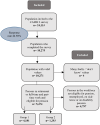Who continues to work after retirement age?
- PMID: 38438993
- PMCID: PMC10913677
- DOI: 10.1186/s12889-024-18161-1
Who continues to work after retirement age?
Abstract
Background: Demographic changes in all industrialized countries have led to a keen interest in extending working lives for older workers. To achieve this goal, it is essential to understand the patterns of retirement and specifically what characterizes individuals who continue to work beyond retirement age. Thus, the aim of this paper was to contribute to the international body of empirical knowledge about individuals who continue in the workforce after retirement age. We present evidence from Denmark and examine what characterizes individuals who continue in the workforce after retirement age and investigate the likelihood of continued work after retirement age while controlling for a set of socio-economic and lifestyle factors.
Methods: The study population consisted of 5,474 respondents to the Copenhagen Aging and Midlife Biobank (CAMB) 2021 survey, divided into two groups. The first group included subjects (n = 1,293) who stayed longer in the workforce even though they had the possibility to retire. The second group consisted of subjects who had retired full-time at the time of the survey (n = 4,181). Survey data was linked to register data to provide a broader dataset. In order to investigate the heterogeneity between the two groups in terms of important socio-economic, work-related and health-related variables, t-test, Mann-Whitney U (Wilcoxon Rank) test, and chi-square tests were employed. Further, to examine the probability of an individual working after retirement age a logit model with step-wise inclusion was utilized.
Results: Overall, individuals who continue to work even though they could retire tend to be wealthier, healthier, and males compared to individuals who are retired full-time. Further, there are more older workers who have partners and are co-habitants than retirees. The likelihood of continuing in the workforce past retirement age is affected by several work-related factors as well as life-style factors. The likelihood of working past retirement age decreases by years spent in the workforce (marginal effect of -0.003), if you have a partner (-0.080) and if your partner is outside of the workforce (marginal effect of -0.106). The likelihood increases by health (marginal effect of -0.044 of moving from excellent/very good health to good health or to fair/poor health, physical working capability (marginal effect of -0.083 of moving from no/some problems to severe problems or cannot work at all) and income (marginal effect of 0.083 from moving from the lowest income-quantile to higher quantiles).
Conclusion: These results are in line with the previous literature and suggest the importance of designing retirement policies that tailor the transition toward retirement according to specific characteristics of both the individual and the segment of occupation.
Keywords: Extending working life; Retirement; Survey data.
© 2024. The Author(s).
Conflict of interest statement
The authors declare no competing interests.
Figures
References
-
- Eurofound . Extending working lives through flexible retirement schemes: partial retirement. Luxembourg: Publications Office of the European Union; 2016.
Publication types
MeSH terms
LinkOut - more resources
Full Text Sources
Medical
Miscellaneous


